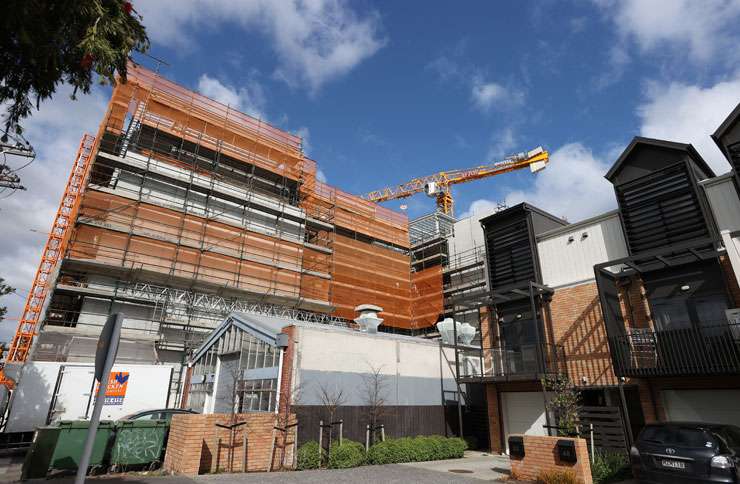Building a new home just got harder. Registered Master Builders Association, which guarantees many new builds, is urging caution around fixed price contracts because they’re too risky in the current market.
The Master Build Guarantee provider is fearful that budget blowouts thanks to cost increases, supply chain issues and lockdowns will drive builders to the wall leaving the association to pick up the tab from the guarantee.
The risk of fixed price contracts is too great, says David Kelly, chief executive of Master Builders.
In the past builders who were confident of their margins have agreed with clients who need fixed price contracts to removed clauses. “We haven't always agreed to that. But that that's the decision they have made,” says Kelly.
Start your property search
“Master Build Guarantee has a significant share of the market. One of the reasons banks like our guarantees is that we cover the situation of insolvency. If the builder goes broke part way through the build, we will step in, find a new builder, and contribute to the additional cost [with] some limits. That’s a significant thing for the bank that we will sit there behind the builder if they go broke.”
AUT professor of construction management John Tookey says builders have been jacking up tenders in order to provide fixed prices, but in the current market that might not be possible. “Banks want a fixed price and what’s inevitably happening is that [builders] are juicing up their tenders in order to be able to fix,” he says.
In normal times that might mean 7-8% per year, “but we're actually going into an unconstrained market space where those escalatory costs are becoming increasingly wild guesses”.

Tony Alexander says builders are likely to run into trouble sooner rather than later. Photo / Fiona Goodall
Tookey cites a waterproofing contractor who had seen a 23% material price increase with little more than a week’s notice. Even the university was seeing massive escalation in costs on tenders.
Banks can factor into their lending contracts that allow for cost escalation adjustments, says Kelly. “We know they will look at it.” It will just most likely be more difficult.
Independent economist Tony Alexander says when banks are forced to accept more flexible contracts they demand higher buffers from borrowers. “[Banks] are increasing the buffer required by buyers of new builds from 10% to 20% of cost overrun.”
This could, however, be problematic for borrowers who don’t have sufficient resources to meet the banks’ buffer demands.
Kelly says he has spoken with two large banks in the last month and they understand the issues. “They understand that fixed price contracts are dangerous for builders. And they understand that fixed price contracts, in the words of one, are a thing of the past for now.”
No control of costs
Kelly says quantifying cost overruns is especially difficult currently. “You can’t even predict it very well. There have been certain products that have had three price increases this year,” he says.
“So, we are starting to say [to members] if you want a guarantee, and you've crossed out those clauses, we’re going to have to think hard about that. Otherwise, we're taking all the risks. Why would we take on all that risk, which is basically members' money?”
Alexander predicts some builders will run into trouble sooner rather than later. “There’s one characteristic that’s always been there for the construction sector,” he says. “It’s usually because our interest rates increase strongly to fight inflation. That hasn’t even started yet.

Construction on new homes in Auckland. Photo / Fiona Goodall
“I’ve been warning (builders) since the start of this year that you're gangbusters now, but in two years’ time, people are going to be pulling back from getting new places built and there'll be a big weeding out.
“I wonder if this part of the weeding out is starting early because of the supply chain, timing, and the cost increase factor?”
What’s more, says Alexander, if buyers must allow for at least a 20% cost overrun, it will inevitably affect the number of houses being built. “It suggests that maybe we're getting close to a peak in the annual number of consents being issued. It reflects , the temporary period of supply chain disruptions going on and what I'm reading suggests that that period extends all through 2024.”
Litigation likely
As cost blowouts start to bite, it is likely building companies will turn to litigation to try to recoup costs from clients, says Tookey
It’s an inevitable consequence of the world we’re living in, he says. “The gestation period for most construction contracts is, at least in the multiple months, potentially, in several years. Over that same period of time, you're also being subject to escalating material prices in the context of a global boom.”
With prices increasing builders are going to look for ways to recoup their losses, says Tookey. That might be on the basis of delay by clients or variations.
Kelly agrees that there will be more litigation as a result of the squeeze on builders’ margins.
One of the big issues for builders is that Kāinga Ora, which is using private builders in a programme to build 10,000 homes, only uses fixed price contracts. “That’s a separate conversation,” says Kelly. “To be fair I know that Kāinga Ora are actively looking at the contract now. It I understand their new contracts that they're looking at will allow for price variations in the new contract, which is really good news.”



